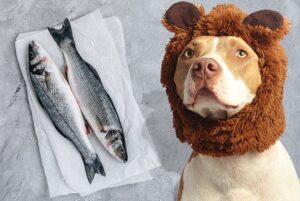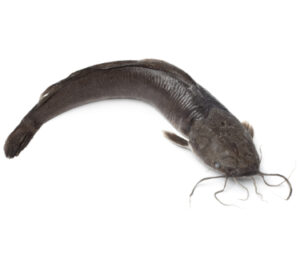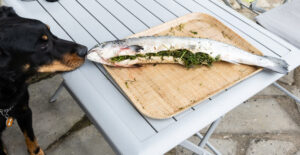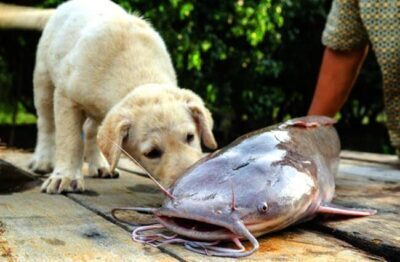Dogs are omnivorous animals, meaning they can consume plant and animal matter as part of their diet. However, not all foods are safe for dogs to eat, and it’s essential to be cautious when offering new foods to your furry friend. One food that may come up as a question for dog owners is Catfish. Can dogs eat Catfish? In this article, we will explore the safety of feeding Catfish to dogs with some recommendations.
Dogs can safely eat Catfish as long as it is cooked and prepared correctly. Catfish is a good source of protein and omega-3 fatty acids, which can help maintain healthy skin and coat. It also contains essential amino acids and minerals that can contribute to a balanced diet for dogs.
However, it is vital to ensure that the Catfish is cooked thoroughly to reduce the risk of food poisoning. Raw or undercooked fish can contain harmful bacteria or parasites that can cause dog illness.
Also, removing any bones from the Catfish before giving it to your dog is essential, as bones can splinter and cause choking or blockages in the digestive system.
It is always a good idea to consult your veterinarian before adding any new food to your dog’s diet, especially if your dog has any food allergies or sensitivities.
Can Dogs Eat Catfish?
Catfish can be a nutritious and protein-rich addition to your dog’s diet. It is a good source of omega-3 fatty acids, which can help support healthy skin and coat and brain and eye development. Catfish is also a good source of B vitamins, which can help to support energy metabolism and the immune system.
However, it is essential to note that fish should be one of many protein sources in your dog’s diet. Dogs also need a balance of other nutrients, such as carbohydrates, fats, vitamins, and minerals, to support their overall health.
When feeding your dog catfish, it is vital to ensure that it is adequately cooked and free of bones. Raw fish can contain harmful bacteria that can cause dog illness, and fish bones can be a choking hazard.
Besides, a good idea to introduce any new type of food to your dog gradually, in small amounts, to ensure that they do not have any adverse reactions to it. As with any change to your dog’s diet, it is always best to consult your veterinarian before making any changes.

What happens if a dog eats a catfish?
If a dog eats an adequately cooked and deboned catfish, it is generally not harmful and can even provide some nutritional benefits. Catfish is a good source of protein, omega-3 fatty acids, and B vitamins, which can support healthy skin and coat, brain and eye development, energy metabolism, and the immune system.
However, if the Catfish is raw or still contains bones, it can harm your dog. Raw fish can contain harmful bacteria that can cause dog illness, and fish bones can be a choking hazard. If your dog has ingested raw fish or fish bones, it is crucial to monitor them closely for any signs of distress or illness, such as vomiting, diarrhea, or difficulty breathing.
Moreover, it is a good idea to introduce any new type of food to your dog gradually, in small amounts, to ensure that they do not have any adverse reactions to it.
Can I give my dog fried Catfish?
While it is generally safe for dogs to eat appropriately cooked and deboned Catfish, feeding your dog fried Catfish is not recommended. Deep-fried foods, including fried Catfish, can be high in fat and calories, leading to weight gain and other health problems in dogs.
Additionally, the cooking oils and seasonings used to fry Catfish may not be safe for dogs to consume.
If you want to include Catfish in your dog’s diet, it is best to bake or grill it instead of frying it. This will help to reduce the fat content and ensure that the Catfish is more digestible for your dog. Ensure that the Catfish is adequately cooked and free of bones before giving it to your dog.
It is always a good idea to introduce any new type of food to your dog gradually, in small amounts, to ensure that they do not have any adverse reactions. As with any change to your dog’s diet, it is always best to consult your veterinarian before making any changes.
What fish can dogs not eat?

Should not feed some types of fish to dogs due to their high levels of mercury or other contaminants. These types of fish include:
Shark
Swordfish
King mackerel
Tilefish
These fish can contain high levels of mercury, which can be toxic to dogs if consumed in large amounts. Ingesting high levels of mercury can lead to symptoms such as tremors, abnormal behavior, and coordination problems in dogs.
In addition to these types of fish, it is also important to avoid feeding your dog raw fish or undercooked fish, as it can contain harmful bacteria that can cause illness in dogs. Fish bones can also be a choking hazard for dogs, so it is vital to ensure that any fish you feed your dog is appropriately deboned.
What kind of fish can dogs eat?
Many types of fish are safe for dogs to eat and can provide numerous health benefits. Some good options for dogs include:
Salmon: Salmon is a good source of omega-3 fatty acids, which can help support healthy skin and coat and brain and eye development. It is also a good source of protein and B vitamins.
Tuna: Tuna is a good source of protein and omega-3 fatty acids, which can support healthy skin and coat and brain and eye development. It is also a good source of B vitamins.
Whitefish: Whitefish is a good source of protein and omega-3 fatty acids, which can support healthy skin and coat and brain and eye development. It is also a good source of B vitamins.
Trout: Trout is a good source of protein and omega-3 fatty acids, which can support healthy skin and coat and brain and eye development. It is also a good source of B vitamins.
Catfish: Catfish is a good source of protein and omega-3 fatty acids, which can support healthy skin and coat and brain and eye development. It is also a good source of B vitamins.
It is essential to ensure that any fish you feed your dog is cooked correctly and deboned to avoid choking hazards or health risks. It is a good idea to introduce any new type of food to your dog gradually, in small amounts, to ensure that they do not have any adverse reactions.
Can dogs eat fish

Yes, dogs can eat fish as part of a balanced diet. Fish can be a good source of protein and omega-3 fatty acids, which can support healthy skin and coat and brain and eye development.
However, ensuring that the fish is adequately cooked and deboned is crucial to avoid choking hazards or health risks. Raw fish can contain harmful bacteria that can cause dog illness, and fish bones can be a choking hazard.
Besides, it is necessary to consider the type of fish you are feeding your dog. Some types of fish, such as shark, swordfish, king mackerel, and tilefish, can contain high levels of mercury, which can be toxic to dogs if consumed in large amounts. Ingesting high levels of mercury can lead to symptoms such as tremors, abnormal behavior, and coordination problems in dogs.
What fish is toxic to dogs?
A few types of fish can be toxic to dogs if ingested. These include:
Pufferfish
Pufferfish contain a toxic protein called tetrodotoxin, which can cause difficulty breathing, muscle weakness, and even death in dogs.
Blue-green algae
These algae can produce toxins that can cause liver damage or even death in dogs. It is often found in stagnant or slow-moving water and can be toxic to dogs, even in small amounts.
Salmon poisoning disease
This serious condition can occur in dogs that eat raw salmon, particularly in the Pacific Northwest region of the United States. The condition is caused by a parasite called Neorickettsia helminthoeca, found in the flesh of infected salmon.
Symptoms include fever, vomiting, diarrhea, and loss of appetite, which can be fatal if left untreated.
Red tide fish
Fish exposed to red tide, a harmful algal bloom, can contain a neurotoxin called saxitoxin, which can cause paralysis and even death in dogs.
Some species of Catfish
Some species of Catfish, such as the stonechat and the madtom, can produce a toxic substance called saponin, which can cause illness in dogs if ingested.
It is noteworthy that properly cooking and handling fish reduces the risk of toxicity. If you suspect your dog has ingested a toxic fish or has been exposed to blue-green algae, it is essential to seek immediate veterinary care.
Can dogs eat fish skin?
Generally, it is safe for dogs to eat fish skin as long as it is cooked and not seasoned with harmful ingredients. Fish is a good source of protein and omega-3 fatty acids, which can benefit a dog’s coat and overall health.
Moreover, it is vital to feed your dog in moderation as part of a balanced diet and to ensure that the fish is cooked thoroughly to reduce the risk of food poisoning. It is also a good idea to remove any bones from the fish before giving it to your dog, as bones can pose a choking hazard or cause other digestive issues.

Is it safe for dogs to eat salmon skin?
Salmon skin is safe for dogs to eat in moderation as long as it contains no bones. Salmon skin can be a good source of omega-3 fatty acids, which can help to improve the health of a dog’s coat and skin.
Furthermore, it is essential to remember that salmon skin is a high-fat food, so we should give it to dogs in small quantities rather than as a regular part of their diet. It is also vital to ensure that the salmon skin is fully cooked, as raw salmon can contain parasites that can harm dogs.
If you are unsure whether it is safe for your dog to eat salmon skin, it is always best to consult your veterinarian for advice.
Can dogs eat fish skin with scales?
Fish skin with scales is suitable for dogs to eat, provided it is cooked and does not contain any added ingredients that could harm dogs. Fish is a good source of protein and omega-3 fatty acids, which can benefit dogs’ coats and skin health.
Additionally, it is crucial to keep in mind that dogs should not eat raw fish, as it can contain harmful bacteria and parasites that can cause illness. Some types of fish can have high levels of mercury, which can be toxic to dogs in large amounts. It is best to feed your dog cooked, plain fish without any added seasoning or ingredients.
Can dogs eat catfish food?
It is not recommended to feed catfish food to dogs. Catfish food is formulated to meet the nutritional needs of catfish and may not be suitable for dogs. Dogs have different dietary requirements than catfish and may not receive the proper balance of nutrients if fed catfish food.
Furthermore, some ingredients in catfish food may be toxic and harmful to dogs. It is always best to feed your dog a diet of high-quality, species-appropriate food to ensure they receive the nutrients they need to stay healthy.
If you have any concerns about your dog’s diet, you should consult a veterinarian or a pet nutritionist for guidance.
Can dogs eat catfish bones?

Fish bones are not recommended for dogs to eat, including catfish bones. Fish bones can splinter and cause blockages or tears in a dog’s digestive tract, leading to serious health issues; fish bones can also cause choking or injury to a dog’s mouth or throat.
In addition, if your dog has eaten fish bones, it is essential to monitor them closely and contact your veterinarian if you notice any signs of distress or discomfort, such as vomiting, diarrhea, loss of appetite, or abdominal pain.
It is always a good idea to keep bones, including fish bones, out of reach of dogs to prevent accidental ingestion. It is also essential to feed your dog a balanced and appropriate diet and to follow your veterinarian’s recommendations for feeding.
Is Catfish poisonous to dogs?
Catfish are not poisonous to dogs. They are a type of freshwater fish commonly eaten as food and considered safe for dogs to eat.
Catfish is a good source of protein, omega-3 fatty acids, and essential amino acids, which can help to support muscle maintenance, healthy skin and coat, and overall good health in dogs.
Do you have to debone fish for dogs?

It is safer to debone fish before giving it to dogs, as bones can pose a choking hazard or cause blockages in the digestive tract. Fish bones can also splinter and cause injury to the mouth, throat, or intestines of dogs.
Moreover, some types of fish, such as smaller, softer-boned species like whitefish or tilapia, may be more accessible for dogs to digest and may not require deboning. It is always good to use caution before giving your dog any fish, especially if it has any health concerns or sensitivities.
If you give your dog fish, it is essential to cook it thoroughly to kill any potentially harmful bacteria or parasites. You should also remove any skin, fat, or visible bones before serving the fish to your dog.
What fish can dogs eat raw?
Raw fish is not recommended for dogs due to bacterial contamination and the potential risk of the parasite. Cooking fish thoroughly can help kill harmful bacteria or parasites and make it safer for dogs to eat.
Suppose you choose to give your dog raw fish. In that case, it is essential only to provide them with fresh, high-quality fish that has been appropriately handled and stored to minimize the risk of bacterial contamination. You should also remove any skin, fat, or visible bones before serving the fish to your dog.
Finally, it is better to avoid feeding your dog raw fish and to stick to cooked, deboned fish as an occasional treat.
How to cook Catfish for dogs

To cook Catfish for dogs, you can follow these steps:
1. Rinse the catfish fillets under cold water and pat them dry with a paper towel.
2. Preheat your oven to 350°F (175°C) or heat a grill to medium heat.
3. Place the catfish fillets on a baking sheet or in a baking dish. Place the fillets on a greased grill rack if you use a grill.
4. Season the Catfish with a small amount of olive oil, lemon juice, and a pinch of salt. If desired, add some chopped herbs or spices, such as parsley, basil, or oregano.
5. Bake the catfish in the oven for 20-25 minutes, or grill it for 10-15 minutes until it is cooked and flakes easily with a fork.
6. Allow the Catfish to cool completely before serving it to your dog. You should remove any skin, fat, or visible bones before giving them to your dog.
Always remember only to give Catfish to your dog as an occasional treat and to consult with your veterinarian before introducing any new food to your dog’s diet, especially if your dog has any health concerns.
Conclusion

In conclusion, inquisitiveness of many about whether can dogs eat Catfish. It is safe for dogs to eat Catfish as long as it is cooked and free of any seasonings or additives. Catfish is a good source of protein and omega-3 fatty acids, which can benefit a dog’s coat and overall health.
Remember that all dogs are different and may have different dietary needs and sensitivities. It is always a good idea to consult a veterinarian before introducing any new food to your dog’s diet, especially if they have any pre-existing health conditions or allergies.
Finally, be sure that the Catfish is cooked correctly to reduce the risk of bacterial contamination to avoid health issues.


